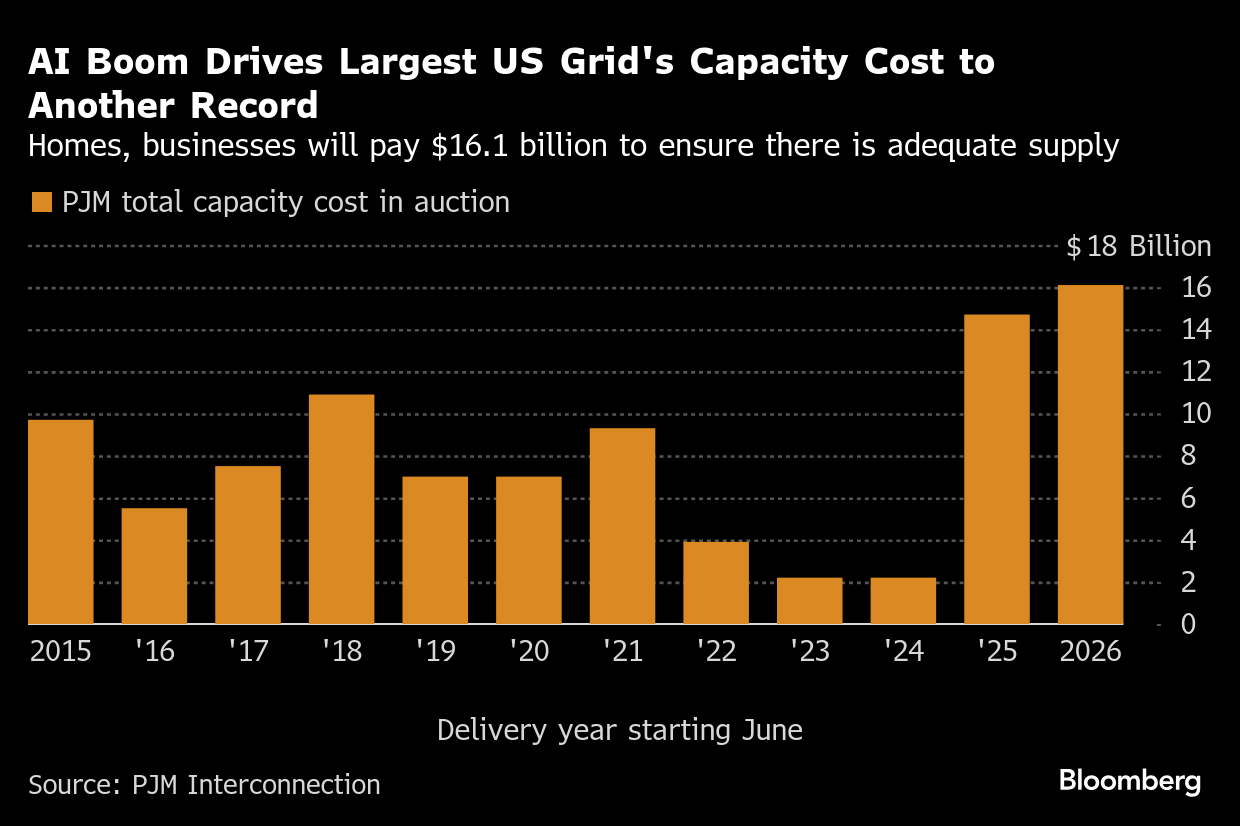AI Boom Leads to Record US Grid Costs, Call for New Plants
(Bloomberg) -- Businesses and households served by the largest US power grid will spend a record $16.1 billion to ensure electricity supplies amid a massive artificial intelligence-driven demand surge.
The payments to generators and other suppliers were set Tuesday at a power auction run by PJM Interconnection LLC, which operates the grid stretching from the Midwest to the mid-Atlantic. It raised the daily capacity price to $329.17 per megawatt from $269.92. Shares of several power companies jumped on the news.
The price increase prompted calls from utilities and energy groups to build more generation. The AI boom is spurring the biggest surge in power demand in decades, leading to soaring utility bills and disagreement over which resources are best equipped to satisfy those needs.
PJM’s power auctions — once only tracked by electricity traders and plant owners — have become closely watched by politicians and consumer advocates. While the power industry is coalescing around new plants as a way to alleviate a potential shortfall, such efforts would also risk adding to household costs at a time when politicians are sensitive about energy inflation.
“It literally tells you we are out of generation,” said Sean Kelly, a former power trader and chief executive officer of power forecasting firm Amperon Holdings Inc. “It’s good for traders, it’s good for asset owners, it is not good for consumers.”
The shares of independent power producers Constellation Energy Corp., Talen Energy Corp., NRG Energy Inc. and Vistra Corp. gained in late trading Tuesday after PJM released the auction results. Talen’s shares rose more than 10% in early trading in New York on Wednesday, while the other four were up more than 4%.

The results of PJM’s auction — which secures a year of electricity supplies starting in June 2026 — may add 1.5% to 5% to consumer electricity bills, according to Executive Vice President Stu Bresler.
“Customers are frustrated by high energy costs and I share their frustration,” Calvin Butler, chief executive officer of utilities owner Exelon Corp., said in an emailed statement.
The capacity auction has a compounding impact on customers as rising demand, shrinking supply and aging infrastructure add to costs, Butler said. To address the shortage, Exelon has proposed building power plants instead of only buying supply from others in the capacity auction, and then passing those costs directly to ratepayers.
Power generators predicted a jump in revenues as a result of the auction. Constellation said it expected to earn almost $2.2 billion over the year, while Vistra forecast $1.2 billion and Talen sees $805 million.
Impact of Data Centers
David Lapp, Maryland’s People’s Counsel, pointed to data centers as the culprit behind another record auction: “Residential customers will continue to bear unreasonably high prices to support actual and projected power demands from data centers owned by some of the world’s biggest corporations.” In a statement Tuesday, Lapp said he expects many Maryland residents to see slight bill increases, though some may see small declines.
While PJM didn’t specify how much of the projected demand increase was tied to AI, Bresler said in a media briefing Tuesday that “the majority of the demand increase you saw was large loads and data center additions.”
After the auction, PJM’s contracted power mix will include 45% natural gas, 21% nuclear, 22% coal, 4% hydro, 3% wind and 1% solar. And although the grid operator has approved about 46 gigawatts of new power supplies for grid connection — mainly renewables and batteries — those haven’t been built because of financing, permitting and supply chain delays.
The results of the auction come amid a debate over older fossil-fuel plants that had been expected to retire. The Trump administration has already moved to keep plants afloat, contending that they’re needed for grid reliability, while also phasing out tax credits for renewables.
Yet, with those subsidies expiring at a time of record auction prices, solar and wind developers will likely try to build everything they can in the next two years, according to Kelly. “We are going to see a lot of renewable generation before the end of 2027,” he said.
(Updates with share moves in sixth paragraph, revenue estimates in 10th)
©2025 Bloomberg L.P.





